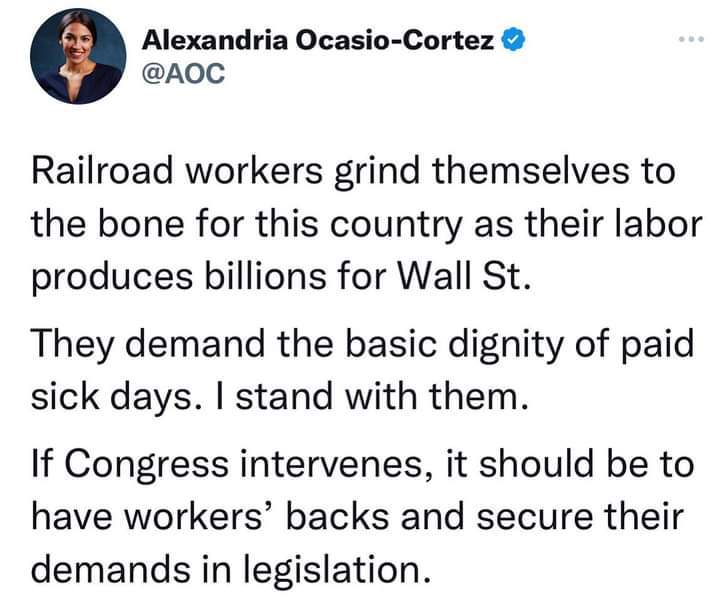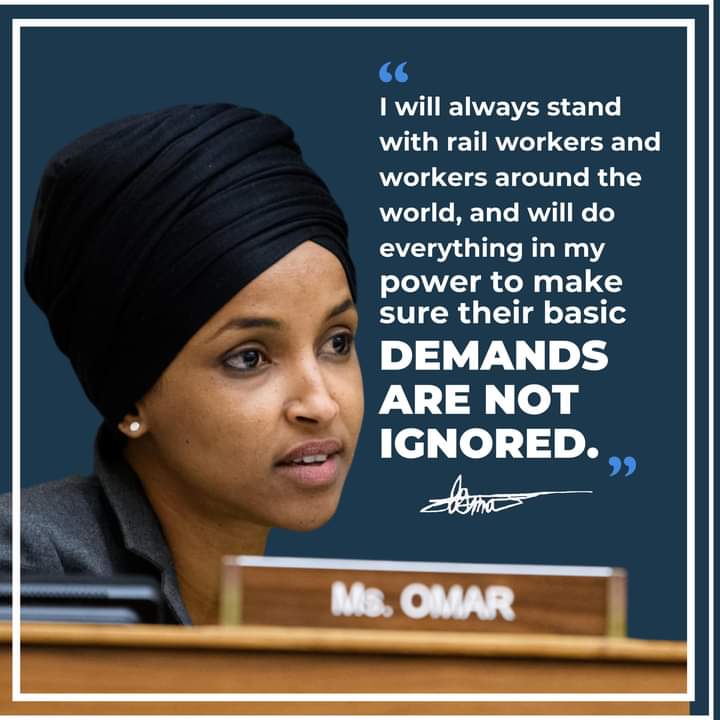We are still in the early days of assessing the potential long-term political implications of the Biden administration’s decision to impose a highly unpopular contract on rail workers with the active support of “The Squad” (with the exception of Rashida Tlaib) in Congress. A line has certainly been crossed, however, and it’s hard to see a way back for those on the Left and in the labor movement who’ve engaged in mind-boggling intellectual summersaults to justify it as a good thing. It should be noted that even Tlaib’s dissent was well within the boundaries of Democratic Party politics.

We’ve witnessed one of the great political blunders of our generation. Biden’s blatant strike-breaking will have dire consequences for the rest of us. He handed the mainstream and paramilitary far right a huge gift, four weeks after many people breathed a sigh of relief that the Republican victories in the midterm election were limited. The fact that no one in Biden’s cabinet threatened to resign over the decision goes to show how far removed from the lives of working-class people they are and the dynamics of U.S. politics today. The two most likely to dissent, Labor Secretary Marty Walsh, who is close to the unions, and Transportation Secretary Pete Buttigieg, who has presidential ambitions, did Biden’s dirty work without any hesitation on Capitol Hill.
The hysterical media coverage of a potential impact of a national rail strike was entirely directed at the unions and their memberships not at the big railroad corporations. The last few years have witnessed a small but important resurgence of trade union activity across the United States. A national rail strike would have provided a potent example of the power of logistics workers to bring the economy to a halt, costing an estimated $2 billion a day. Such a powerful display of workers’ power and its potential uplifting impact on the class struggle in the U.S. had to be squelched. Biden’s strike breaking casts a shadow on upcoming national contracts, such as next year’s Teamsters contract with United Parcel Service (UPS), where strike talk has been in the air for two years.

Unfortunately, this doesn’t mean that the labor movement is going to break with the Democrats. The trade union bureaucracy in the U.S. is just too craven and corrupt. Just look at the obsequious behavior of the Teamsters’ “new, militant, and progressive” leadership of Sean O’Brien and Fred Zuckerman. Two rail unions are affiliated with the Teamsters: the Brotherhood of Maintenance of Way Employees (BMWE) and the Brotherhood of Locomotive Engineers and Trainmen (BLET). O’Brien and Zuckerman welcomed the presidential intervention and then told their two affiliated rail unions to accept the shitty deal. O’Brien personally attended the Teamsters BLET convention and told the delegates to stop whining and talking to outsiders. On the eve of the Senate vote, O’Brien posted an odd video of himself walking in the rain in Washington, D.C. talking about how he was fighting for the members.
Despite the anger and disappointment with the members of The Squad, specifically those who are members of the Democratic Socialists of America (DSA), it is not going to result in any disciplinary action against them or even to force it to take clearer stands on the Democratic Party or Biden’s actions. We have been down this road many times before, most recently with Jamaal Bowman and his vote on funding Israel’s Iron Dome. DSA has been in decline for several years and has been losing members at a rapid pace. Despite the anger at Biden and the Squad, we are likely to see what we’ve seen before; DSA members get angry and may pass resolutions condemning their actions, but in the end, will quit in small or large groups because they feel there is no way to change the organization. And, they are right on that point.
What we are likely to see is the mainstream and paramilitary right have a field day with Biden’s strike breaking. Tony Cardwell, the president of the Teamster-affiliated BMWE, whose members voted down the contract, appeared on Steve Bannon’s The War Room and Fox News. Cardwell was welcomed with open arms. For those who don’t remember, Bannon was the former publisher of the far-right Breitbart News, Trump’s 2016 campaign manager and senior White House advisor, and a January 6 coup plotter. He was pardoned by Trump and later cited for contempt of Congress for refusing to appear before the January 6 committee. “This will be remembered,” Cardwell told Bannon’s audience.

The influence of the far right on sections of the U.S. working class has been a growing concern for decades. It has been part of the dynamic of international politics for the last four decades because of the embrace of neo-liberal economics by the Social Democratic parties in Europe and the liberal Democrats in the U.S. have pushed industrial workers, especially into the arms of the far-right in too many places. Attempts to revive old Social Democratic policies by Corbyn in the British Labour Party and Sanders in the Democrats failed, while the revolutionary Left in too many places remains fragmented and irrelevant to the industrial working class. Far-right agitation among the U.S. working class will be emboldened by Biden and The Squad’s actions.
Senator Josh Hawley (R-MO.), a member of the Senate “sedition caucus,” for example, voted against imposing the contract (and stopping a potential strike) and was one of three Republicans to support the separate bill for sick pay for rail workers. He told Fox News:
“These are working class independent voters, many of them Republican voters, I mean in my state there’s over 3,000 of these railroad workers. These are people who live very conservative lives, and they just want to have a chance to earn a good living. Are you for working people or not? My feeling is that if the Republican Party is going to be a majority party in this country, we have to be for working people.”
While so much of this is empty posturing, it creates an opening for the far right, who have a critique of the United States’ two-party system and “woke” corporations, trying to appeal to white working-class voters.
Fortunately, Railroad Workers United (RWU), though small, has attempted to put forward a different program for rail workers. According to RWU organizer Ron Kamikow:
“We have been played for well over a century by politicians and union officials alike. The fiasco of recent months will show that perhaps the time has come for railroad workers to push for a unified and powerful labor organization of all crafts, together with a political party that will better serve the interest of not just railroad workers but all working-class people.”
This strong hint of the need for a labor party is a welcome change in U.S. trade union politics but will face hostility from the Democrats and the far right, who have no interest in seeing a working-class based party in the United States.
For Tempest, recent events add urgency to several political questions before the revolutionary socialist Left in the United States. The first and foremost is the utility of socialists, who know which side of the class line they are on, remaining members of DSA, which is so damaged and irreformable at this point. The second issue before us is the need to take steps to create a larger revolutionary socialist grouping—to move beyond the fragments of the revolutionary Left. There are several thousand revolutionary socialists in the U.S. in and around DSA and scattered through different formations. Most of us feel the need to be in a larger organization, yet such a group can only emerge out of debate, discussion, and cooperative work and struggle. We look forward to having those discussions.

